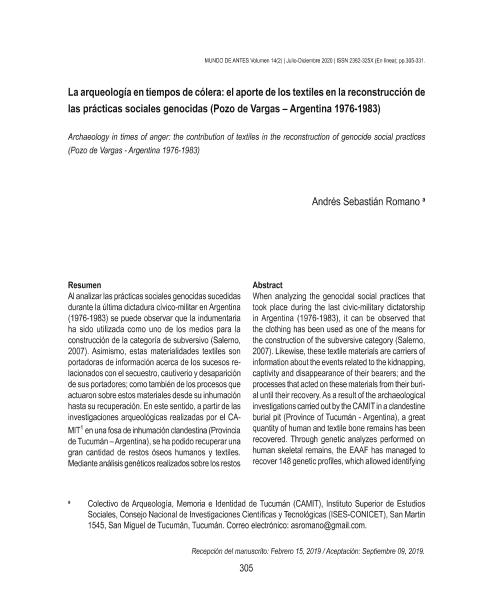Mostrar el registro sencillo del ítem
dc.contributor.author
Romano, Andres Sebastian

dc.date.available
2021-10-18T12:31:39Z
dc.date.issued
2020-10
dc.identifier.citation
Romano, Andres Sebastian; La arqueología en tiempos de cólera: el aporte de los textiles en la reconstrucción de
las prácticas sociales genocidas (Pozo de Vargas – Argentina 1976-1983); Publicaciones del Instituto de Arqueología y Museo (IAM-UNT); Mundo de Antes; 14; 10-2020; 305-331
dc.identifier.uri
http://hdl.handle.net/11336/144010
dc.description.abstract
Al analizar las prácticas sociales genocidas sucedidas durante la última dictadura cívico-militar en Argentina (1976 - 1983) se puede observar que la indumentaria ha sido utilizada como uno de los medios para la construcción de la categoría de subversivo (Salerno 2007). Asimismo, estas materialidades textiles son portadoras de información acerca de los sucesos relacionados con el secuestro, cautiverio y desaparición de sus portadores. Como también de los procesos que actuaron sobre estos materiales desde su inhumación y hasta su recuperación. En este sentido, a partir de las investigaciones arqueológicas realizadas por el CAMIT en una fosa de inhumación clandestina (Provincia de Tucumán ? Argentina), se han podido recuperar una gran cantidad de restos óseos humanos y textiles. Mediante análisis genéticos realizados sobre los restos óseos humanos, el EAAF ha logrado recuperar 148 perfiles genéticos, los cuales permitieron identificar nominalmente a 108 compañeros/as detenidas y desaparecidas. En tanto de los textiles se alcanzaron una serie de resultados objeto de este trabajo.El abordaje de los textiles nos brinda la posibilidad de elaborar un discurso alternativo a la fragmentaria y manipulada historia "oficial". En este sentido, el aporte más importante de este trabajo es escribir otra historia a través del estudio de formas no discursivas como la cultura material.
dc.description.abstract
When analyzing the genocidal social practices that took place during the last civic-military dictatorship in Argentina (1976-1983), it can be observed that the clothing has been used as one of the means for the construction of the subversive category (Salerno, 2007). Likewise, these textile materials are carriers of information about the events related to the kidnapping, captivity and disappearance of their bearers; and the processes that acted on these materials from their buri- al until their recovery. As a result of the archaeological investigations carried out by the CAMIT in a clandestine burial pit (Province of Tucumán - Argentina), a great quantity of human and textile bone remains has been recovered. Through genetic analyzes performed on human skeletal remains, the EAAF has managed to recover 148 genetic profiles, which allowed identifying nominally 108 arrested and disappeared companions. This paper presents the results achieved through the study of textiles. This approach offers us the possibility of elaborating an alternative discourse to the fragmen- tary and manipulated “official” history. In this sense, the most important contribution of this article is to write another history through the study of non-discursive forms of evidence such as material culture.
dc.format
application/pdf
dc.language.iso
spa
dc.publisher
Publicaciones del Instituto de Arqueología y Museo (IAM-UNT)
dc.rights
info:eu-repo/semantics/openAccess
dc.rights.uri
https://creativecommons.org/licenses/by-nc-sa/2.5/ar/
dc.subject
Prácticas Genocidas
dc.subject
arqueología forense
dc.subject
inhumaciones clandestinas
dc.subject
textiles
dc.subject.classification
Arqueología

dc.subject.classification
Historia y Arqueología

dc.subject.classification
HUMANIDADES

dc.title
La arqueología en tiempos de cólera: el aporte de los textiles en la reconstrucción de
las prácticas sociales genocidas (Pozo de Vargas – Argentina 1976-1983)
dc.title
Archaeology in times of anger: the contribution of textiles in the reconstruction of genocide social practices (Pozo de Vargas - Argentina 1976-1983)
dc.type
info:eu-repo/semantics/article
dc.type
info:ar-repo/semantics/artículo
dc.type
info:eu-repo/semantics/publishedVersion
dc.date.updated
2021-09-07T14:47:07Z
dc.identifier.eissn
2362-325x
dc.journal.volume
14
dc.journal.pagination
305-331
dc.journal.pais
Argentina

dc.journal.ciudad
San Miguel de Tucumán
dc.description.fil
Fil: Romano, Andres Sebastian. Consejo Nacional de Investigaciones Científicas y Técnicas. Centro Científico Tecnológico Conicet - Tucumán. Instituto Superior de Estudios Sociales. Universidad Nacional de Tucumán. Instituto Superior de Estudios Sociales; Argentina
dc.journal.title
Mundo de Antes
dc.relation.alternativeid
info:eu-repo/semantics/altIdentifier/url/http://www.mundodeantes.org.ar//pdf/revista14-2/10-http://www.mundodeantes.org.ar
Archivos asociados
